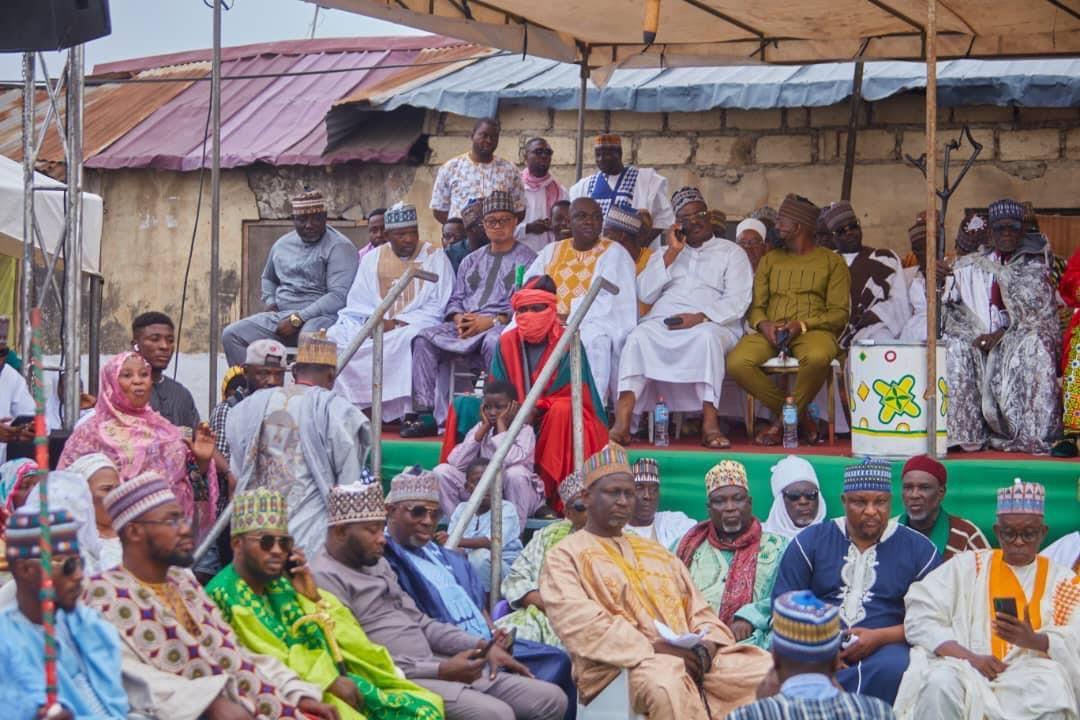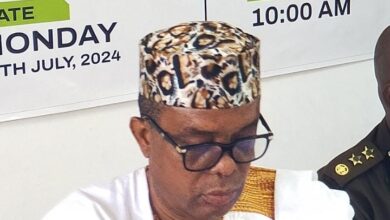Accra Zongo Durbar Of Chiefs Attract Thousands

The Greater Accra Zongo Durbar of Chiefs and World Hausa Day under the auspices of Sarkin Zongon Ankara, Sarki Alhaji Yahya Hamisu Bako attracted over thousands of people across the Greater Accra Region.
The Durbar of Chiefs and the World Hausa Day Celebration was under the theme “Owning up to our responsibilities as Hausa Zango men” in the Communities/ “The role of Hausa in the cultural and socio-economic development of Ghana”.
The Durbar was aimed at promoting and projecting the culture of the Zongos as well as to advocate and promote the Hausa language and protect the well-being of the Hausas in Ghana.
The colorful and well organized event brought together a number of Zongo Chiefs, Queen mothers and traditional Chiefs from all walks of life.
There were other dignitaries including political party representatives and the Chief Executive Officer of the Zongo Development Found.
As part of the celebration, sub-chiefs from various tribes living in the Zongo communities formed a procession from the Abossey Okai Central Mosque through the principal street of Sabon Zongo to the Durbar grounds to pay homage to the Greater Accra Zongo Chief and the invited guests.
An historian Mohammed Mansur Hadi who gave a brief history on how Sabon Zongo came to being revealed that the name ” Sabon Zango” has its etymology from the Hausa Language which literally means the “new settlement”.
He said the town was founded by some of the earliest Hausa settlers in Southern Ghana and it remains one of the oldest Zango settlements in the country.
This he noted was due to a number of events that culminated in the resettlement.
He added that Sabon Zango is also the birthplace of Ghana’s current Second lady Samira Bawumia.
He further revealed that in the early 80s, there was an influx of migrants from the Sahel Region of West Africa to the coastal cities and some of these settlers settled in Old Accra, near the Accra High Street.
The Fulani migrants according to him tended cows whiles the Hausa and Zarma (Zabarmawa) migrants were traders along the West African sub region.
The Hausas in Accra traded in kola from the hinterlands through the Jamestown Port.
Mohammed Mansur Hadi stated that Sabon Zango was founded by one of the earlier Hausa settlers, Mallam Barko, the son of Mallam Na-Inno. Mallam Na-Inno and his close associate, Mallam Garba arrived in Accra from Katsina between 1845 and 1850, primarily to spread Islam. On arrival, they lived in James Town, Ga-Mashie, in a rented house, which is traceable till this day. In March 1881, Mallam Na-Inno and Mallam Garba secured land from the chiefs and elders of Ussher town to establish the first Muslim settlement called Zangon Ussher town or Zangon Mallam.
Twelve years later in 1893, Mallam Na-Inno, who was the Imam of Accra and the chief of Zangon Mallam died. He was succeeded by his son, Mallam Barko (after the resettlement to Sabon Zango), and the role of the Imam of Accra was given to Mallam Garba, Na-Inno’s associate. Mallam Garba also died in 1902, shortly after he had been re-instated as the Imam of Accra by the then Colonial Governor Sir Matthew Nathan.
He noted that while Mallam Na-Inno is associated with the founding of Zangon Ussher town or Zangon Mallam or present Zango-Lane, his son, Mallam Barko, had his name attached to the founding of Sabon Zango, about 5 kilometers to the South-west of the old Zangon-Mallam in Ussher town (Zango-Lane)
The Chairman of the Hausa Day and Durbar of Chiefs celebration, Alhaji Jalil Abubakar used the occasion to call on Hausas in Ghana to know their rights as citizens of Ghana so as to participate in national activities.
According to him, Hausas were recruited into the various security agencies before, during and after independence adding that they are still playing major roles in the development of the country.
He said the Accra Zongo Chief, Sarki Alhaji Yahya Hamisu Bako and some prominent Zongo personalities have drawn the government’s attention to how the Hausas and the people of the Zongos are being intimidated at the passport office and other state agencies when acquiring national documents.
The procession was characterized by drumming, brass band display and riding of horses.
Source: Muhammed Faisel Mustapha




